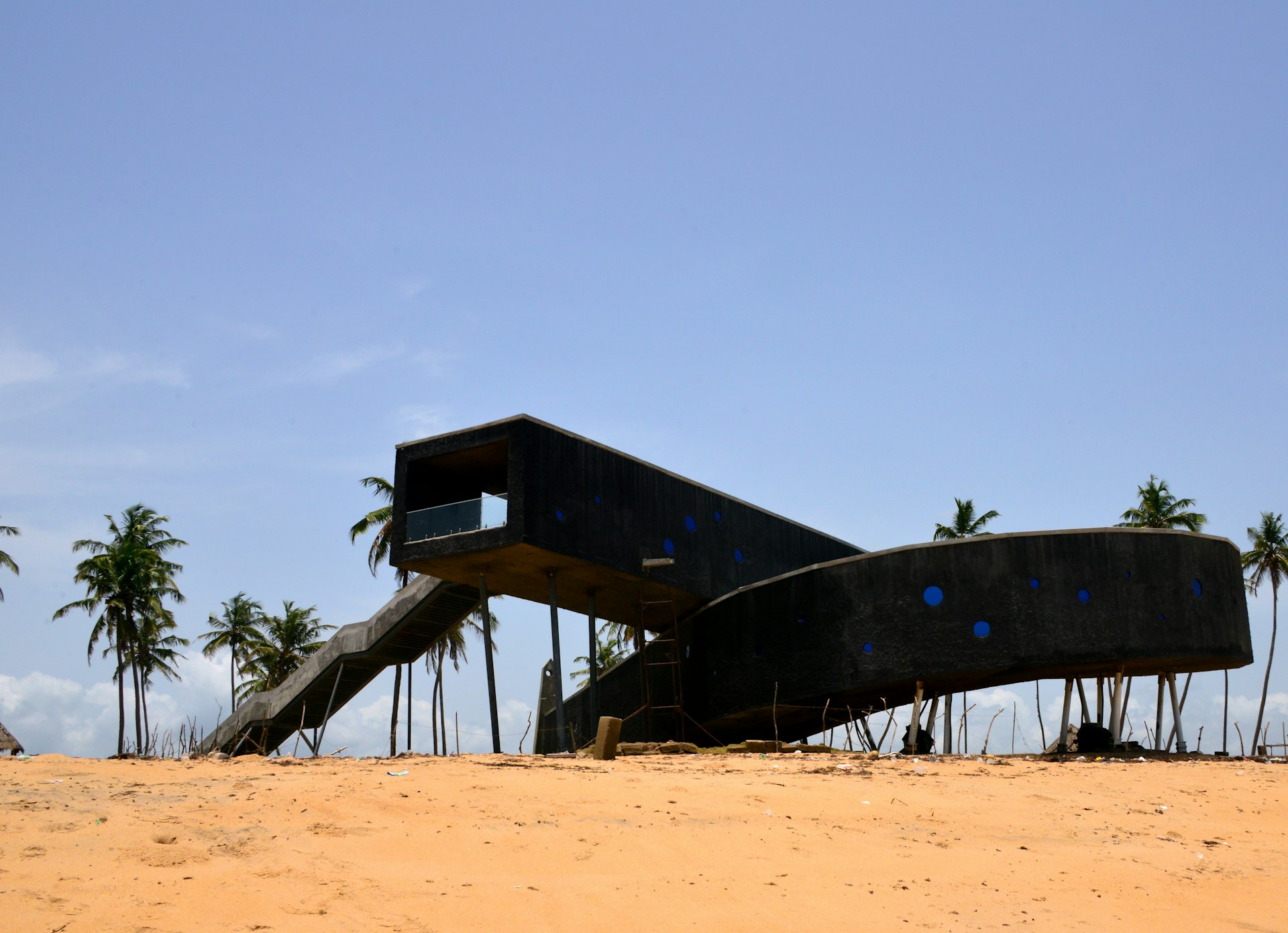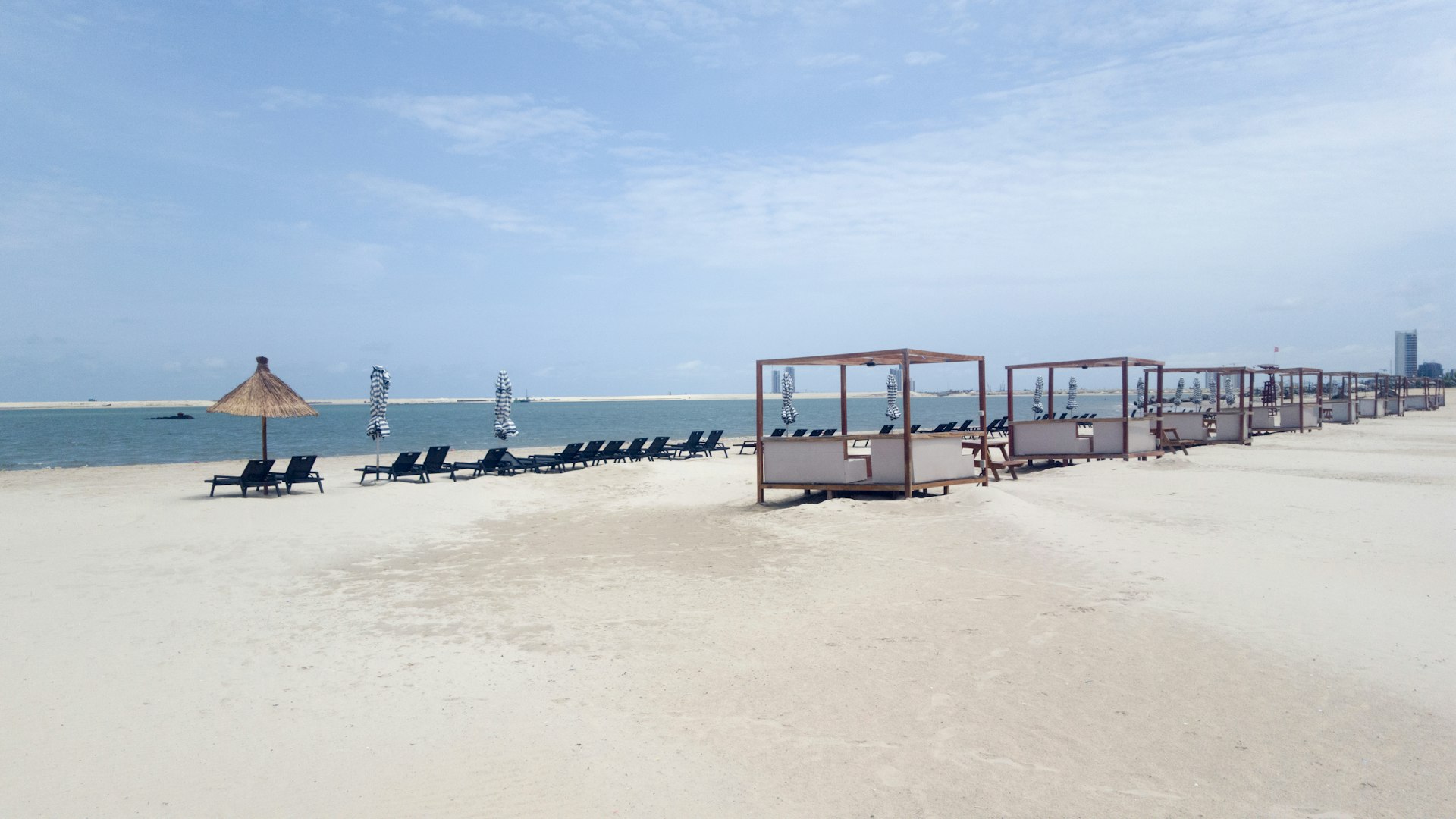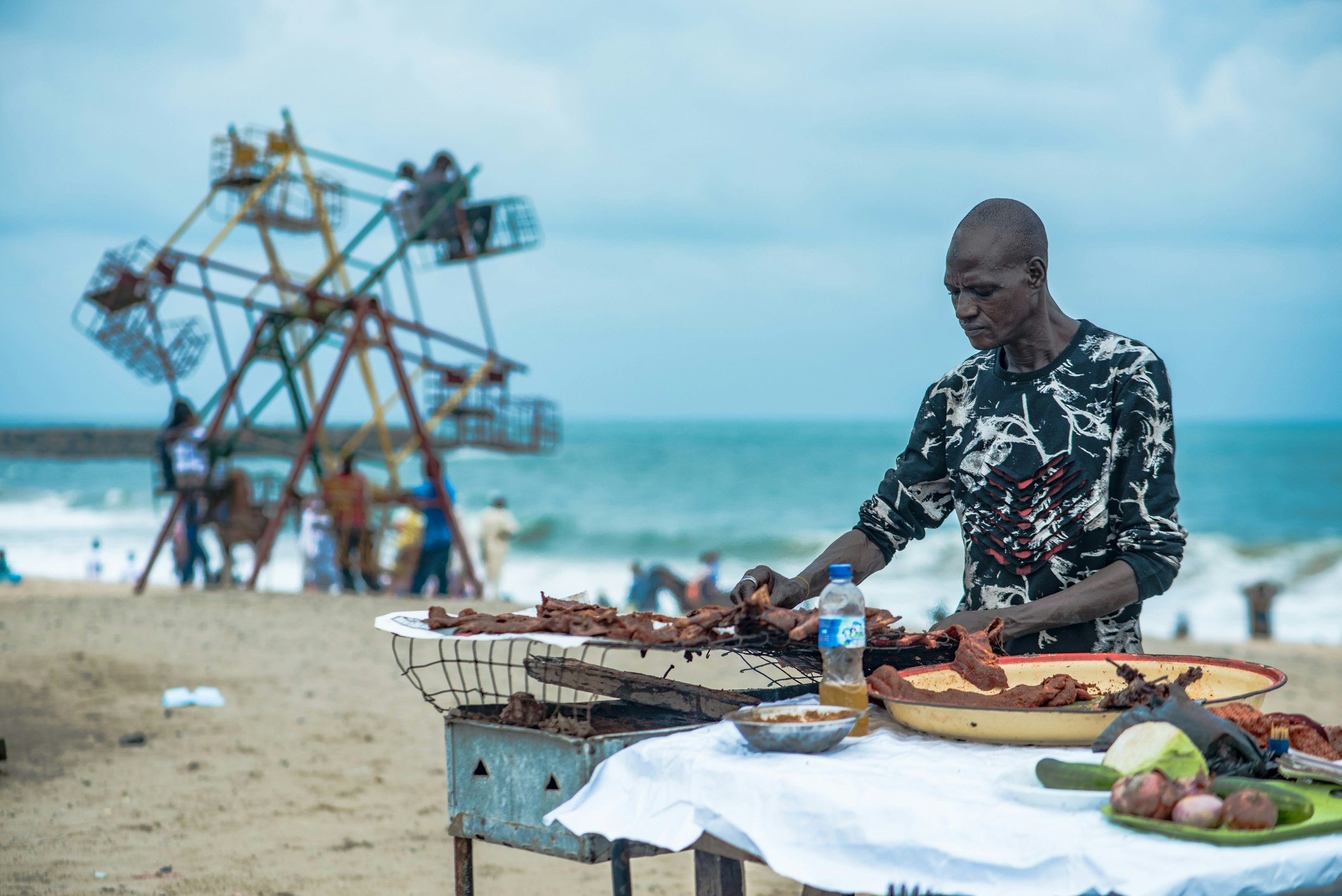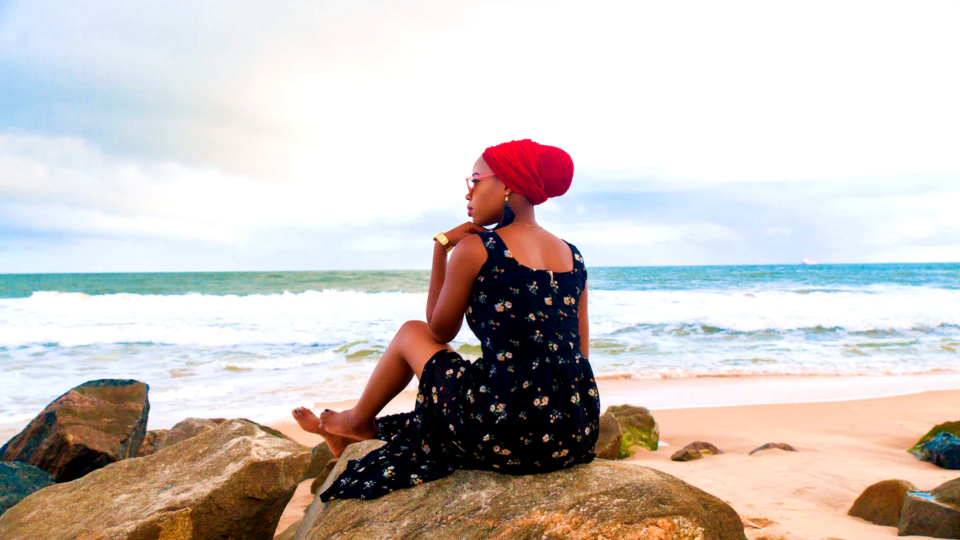- By Pelu Awofeso
With more than 800km (30 miles) of coastline, Nigeria has a long stretch of beaches to lounge in.
Lagos, the country’s entertainment and business capital is where they’re best developed, and where you’ll find a fine collection of private beach clubs and resorts, most open every day of the week. Entry tickets are from N1000 for public beaches and upwards of N3000 for private ones.
In the Niger Delta region, most of the beaches have a community ring to them, and entry is almost always free. With few recreation options, they are where locals go to unwind and socialize – and more so at Easter and Christmas holidays. In some areas, like Ibeno, an informal management board ensures that beachfronts are kept clean, and visitors feel safe.
Generally, beaches in Nigeria are a noisy world. From Lagos and Delta to Akwa Ibom and Rivers, expect to be inundated with loud music. Yes, Nigerians love to party, and one of the places you’ll find that lifestyle fully expressed is on a beach. Rest assured, though, there are cozy and quiet ones too, especially on the Epe and Badagry axis.
Whatever your taste is in beaches, there’s one for you. Here are a few to dig your heels into.
1. McCarthy Beach
Fancy swimming in aquamarine-green waters so clear that you can see the sandy floor and the fish? This is one of the pleasures of visiting Gordon Resort Hotel’s McCarthy Beach in Abraka (Delta State). If you would rather not swim but would love to float gently around, you can opt for a ride in a local boat, paddling yourself –with guidance from the operator – as you do.
For something more exciting, get on any of the jet boats and go on a cruise on River Ethiope instead. Whether you’re visiting solo or in a group, this brief ride – just 15 minutes – reveals more charming sections of the creeks and their birds than you’ll see just lying around on the beach. (Costs range from N6000 to N11,000.)
Back on the shore, settle down at one of the benches. (They seat four to 10 people; the bigger ones hold as many as 20.) Order drinks from any of the three bars, and grilled food and snacks from the kiosks. If you’re in the mood, get up and dance – yes, there’s loud music – or go play paintball. On a good day, you’ll see local fishermen arrive with basins of tilapia; they’re traded quickly and soon end up on the grills.
2. Port Harcourt Tourist Beach
Call this a “Sunday-Sunday” beach and you won’t be wrong. That’s because Sundays are when this beach in Borokiri, around Port Harcourt’s old quarter, is at its liveliest. Residents trickle in starting around 3 pm, settling down first into rows of sheltered concrete seats overlooking the creeks. Speed boats and ships float idly nearby.
As dusk approaches, there are more people than the original sitting arrangement can take. They spill into the open-air sections, where plastic chairs and tables have been arranged specifically for this purpose. Vendors sell bole and fish (a signature delicacy of Port Harcourt) and an assortment of food and drinks. DJs keep the crowd entertained until they’re ready to leave.
Detour: On your way in or out, stop at the Port Harcourt National Museum (Harley St), housed in a colonial-era storied building. You’ll need only 30 to 45 minutes to go through the exhibition, but it’ll give you a good grounding on the history, culture, and lifestyle of the Niger Delta.
3. Ibeno Beach
The coastline at Ibeno is a long stretch, but most people go to the beach at Inua Eyet Ekot. Also called the “big beach,” the sheer expanse of this strip of firm white sand and gently rushing wind is a thrill in itself. As you settle down at the bars and restaurants, or under canopies and beach umbrellas, you’ll notice the steady tumble of the waves, a soothing soundtrack to the chitchat coming from different tables.
On the menu, you’ll find some of the tastiest dishes from the Niger Delta: rice and pepper soup, fufu and fisherman soup, and gari and afang soup. Itinerant vendors sell everything from peppered snails in plastic buckets to fresh-cut coconut in wheelbarrows, so you can have coconut water on the spot. If you prefer something more upscale, go to the new and tastefully decorated Happy Hour bar.
Detour: Ibeno is a town of fisherfolk who are busy year-round. Go to neighboring Mkpanak just before dawn to catch the boats speeding off to the high sea, or early afternoon to catch them returning with boatloads of fish, crayfish, and crabs. The sorting, packing, and sharing stretches into the evening.

4. Gberefu Beach
If you visit Badagry and tour its slavery relics and museums, chances are you’ll end up at Gberefu Beach (aka Point of no Return). That’s because the sightseeing ends with a five-minute boat ride across the lagoon and a 20-minute walk on the sandy island to the coast.
While you won’t find too many chairs and tables around, you won’t miss them either. The ebb and flow of the sea is so hair-raising that visitors just stroll to the foamy waters, dip their feet in and sit as close to it as they feel comfortable.
Planning tip: A tour of Badagry’s slavery sites lasts two to four hours, depending on what you plan to see or leave out. But don’t miss the recently opened Velekete Slave Market Museum; aside from its very detailed exploration of the transatlantic slave trade, your tour ends with a look at the dungeon.
5. Avista Beach
If you would rather avoid the bigger and busier beaches and cozy up in far more serene surroundings instead, head for Avista Beach Resort in the Okun Ajah area of Lagos. It’s a beach that doubles as a garden, and there’s a turtle and a tortoise in the mix. The cabanas come with touches of Afrocentric decor, which blends nicely with its smart and minimalist furnishing, not to mention the wall art everywhere.
The resort’s private huts – covered in refined thatch roofing and tagged “lovers’ garden” – are for short stays and perfect for couples. You can rent one at N25,000 for a 12-hour cycle. There are also rooms and apartments if you wish to stay over, which entitles you to a bonfire night.
Planning tip: Okun Ajah is a busy beach corridor. If at any time you’d like a change of scene, feel free to beach hop – there are more than a dozen beach resorts to choose from.

6. Landmark Beach
You could spend an entire day at Landmark Beach and not run out of things to do. The breadth of its recreational activities is unmatched, and that includes everything from ball and water sports to paintball and quad biking. This is more or less a family-focused beach, so kids have more than enough to keep them excited. (The water park in particular is a hit with teenagers.)
To avoid the long queues that can sometimes build on weekends, be sure to download the Landmark Citizen app. While this ensures that you can buy your tickets at cheaper rates, it also lets you pay for pretty much anything within the facility, including food and cabanas.

7. Elegushi Beach
Elegushi is a nest of beaches, restaurants, and oceanfront clubs ideal for family hangouts. On weekdays, the beach complex is quiet and only a few people can be seen around, praying facing the ocean, or having a drink at any of the bars. On weekends, visitors are known to chill here all night.
On some days, some itinerant musicians perform to your delight; they don’t charge for this but do appreciate whatever you can give. Throughout the week, you’ll find a group of horse riders happy to let you mount the saddle and gallop along the shoreline. The standard price for a to-and-fro trip of about 100m (328ft) is N2000; it’s half that if you only want to pose for pictures.
Detour: The all-white four-story Nike Art Gallery is on the driveway that leads to Elegushi. Step in to see a heartwarming collection of paintings, sculptures, fabrics, and accessories. Its craft shop is filled with delightful souvenirs.
SOURCE: Lonely Planet



